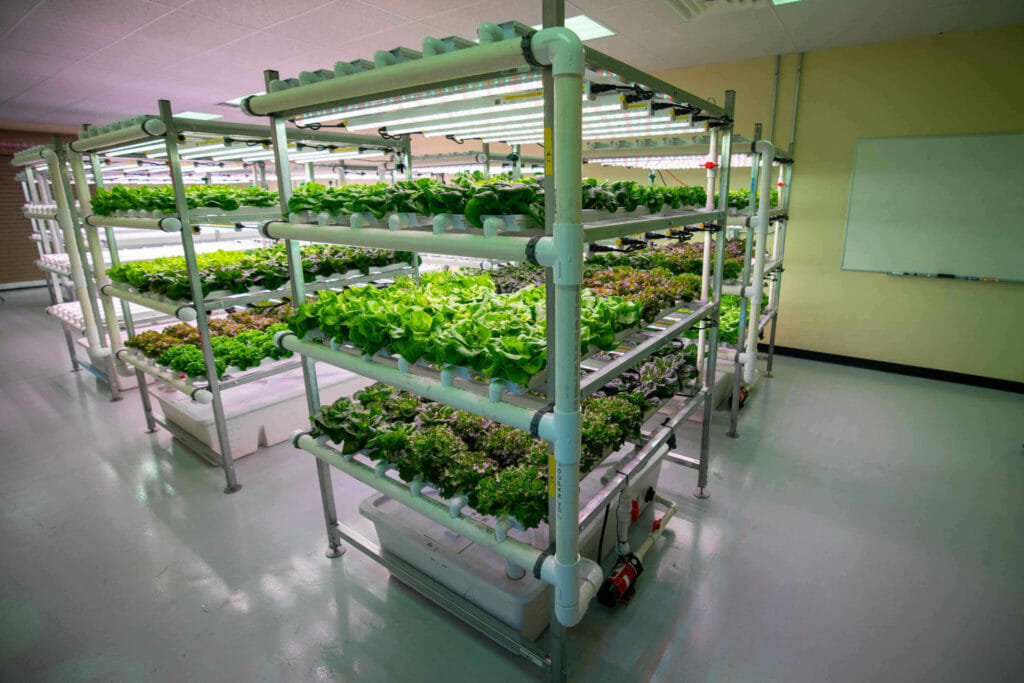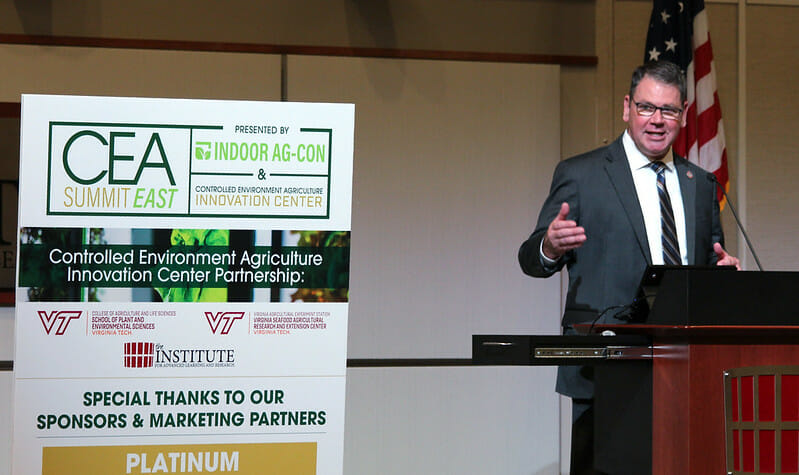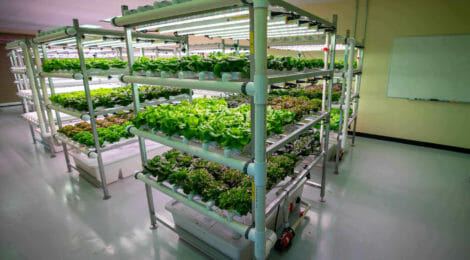Several partner organizations recently completed the development of a strategic roadmap regarding the economic growth potential for the Controlled Environment Agriculture (CEA) industry in the Commonwealth of Virginia, specifically in the 15 localities within GO Virginia Region 3. Analyzing the current state of the industry, this roadmap outlines ways that the partners can support future economic growth among large and small companies in the CEA sector through a variety of initiatives tied to collaboration, research, economic development, workforce training and more.
The development of this roadmap, which was completed by the Virginia Tech Center for Economic and Community Engagement (CECE) in partnership with IALR, was funded through a $77,000 grant from GO Virginia Region 3.

“While controlled environment agriculture is not a new industry, it is growing quickly and has major economic implications for our region. Intentional partnerships and public-private collaboration are what will allow this important sector to thrive and expand right here in Southern Virginia and across the Commonwealth. Building on the current strength of the region, this roadmap outlines several crucial steps we can take to advance the CEA industry.” — Dr. Scott Lowman, Vice President of Applied Research, IALR
CEA involves a combination of engineering, plant and animal science, and computer-managed control technologies used to optimize plant and animal growing systems, quality and production efficiency. Growing systems range from a basic greenhouse to a fully automated system with controlled lighting, water and ventilation installed. By controlling various elements of the growing environment, CEA can decrease pesticide and water use and allow for year-round production close to consumers. The concept of CEA is not new, but more recent technological advancements like biotechnology, robotic imaging and machine learning have changed the economics of CEA as an industry.
The primary recommendation of the roadmap is the development and implementation of a comprehensive CEA hub initiative, in conjunction with or led by IALR and the Virginia Tech-IALR CEA Innovation Center. This hub would lead and advance five additional strategies in GO Virginia Region 3 and across the state:
- Conduct CEA awareness and informational campaign
- Enhance CEA-specific new venture and new enterprise development assistance
- Continue and expand CEA technical assistance offerings to firms and to policymakers and economic developers
- Accelerate GO Virginia Region 3 site development with CEA targets in mind
- Continue and enhance GO Virginia Region 3 CEA-relevant workforce development and talent attraction activities
“We were excited to find that continued growth is expected in the CEA industry. GO Virginia Region 3 is well-positioned to remain competitive as a location for this growth. In addition, the CEA Hub Initiative would help the region, and the state, to better maximize this opportunity and grow CEA sector jobs of all types, from smaller start-ups to large-scale indoor farming.” — Dr. Scott Tate, Associate Director for Community Innovations, Virginia Tech Center for Economic and Community Engagement
Due to the technology used in CEA, the skillsets required tend to be more varied than traditional farming and typically appeal to a younger workforce. Although much of CEA is automated, skilled workers are still invaluable for guiding and overseeing the equipment, plant and animal health, and other hands-on work. Some common occupational areas within CEA companies include crop production, animal production and aquaculture, machinery manufacturing and computer and electronic product manufacturing.
Virginia Secretary of Agriculture and Forestry Matthew Lohr recently shared remarks during the presentation of this roadmap at IALR.
“When an organization lacks vision, it is much harder to reach the destination. This roadmap outlines how Southern Virginia can become a hub for the CEA industry and the steps needed to get there. The synergies outlined in this plan, including workforce training, research, increased awareness and site development will make Southern Virginia a CEA leader.” — The Honorable Matthew Lohr, Virginia Secretary of Agriculture and Forestry

The partners involved in the study identified a total of 18 CEA companies operating or preparing to open in Virginia, seven of which are larger operators that have 50 or more employees. In all as of 2022, the team estimates there are approximately 35,000 existing CEA-related jobs in the state, 1,750 of which are in GO Virginia Region 3. Virginia has seen an increase in CEA companies locating in the state, with announcements of major projects like Plenty in Chesterfield County in 2022, expected to bring 300 new jobs and $300 million in investment to the area. Blue Ridge Aquaculture, a Martinsville-based company that is the largest indoor system producer of tilapia in the world, and AeroFarms, a leading vertical agriculture company that established one of the world’s largest aeroponic smart farms in Danville-Pittsylvania County’s Cane Creek Centre, are the largest existing CEA companies in GO Virginia Region 3.
“One of the primary goals of economic development is increasing household income, which typically leads a region’s residents to experience increased educational attainment, improved health outcomes, housing values, and household discretionary income. While large CEA companies can provide quality and high-wage employment opportunities in GO Virginia Region 3, another critical focus of this strategy is to promote and facilitate CEA-related entrepreneurship and small business opportunities, combining macro and micro approaches to grow this emerging business sector in Southern Virginia.” — Bryan David, GO Virginia Region 3 Program Director
The study identifies the Virginia Tech-IALR CEA Innovation Center, located on IALR’s campus, as a “unique and crucial asset and resource for innovators, policymakers and industry in the CEA sector.” This facility, which is operated through a partnership with IALR, the School of Plant and Environmental Sciences at Virginia Tech and the Virginia Seafood Agricultural Research and Extension Center, leverages the biotechnology and chemistry research at IALR and serves as a demonstration site and agricultural technology training center that brings together industry, academia and producers.
The CEA Innovation Center also serves as a co-host of the annual CEA Summit East.
“The outstanding work conducted by the whole team in developing the CEA Roadmap will help all of us to effectively work together in our common goal of making Virginia an international hub for controlled environment agriculture and utilizing the growing field of controlled environment agriculture as an economic development engine for Virginia. We are looking forward to exciting collaborations going forward.” — Dr. Michael Evans, Director of the School of Plant and Environmental Sciences, Co-Director of the CEA Innovation Center
About GO Virginia Region 3
GO Virginia is a statewide, business-led economic development initiative with funding to invest in collaborative projects that lead to high-paying jobs in each region. The mission of GO Virginia is to encourage collaboration among business, education and government in each region. GO Virginia Region 3 is one of nine regions in Virginia and includes the counties of Amelia, Brunswick, Buckingham, Charlotte, Cumberland, Halifax, Henry, Lunenburg, Mecklenburg, Nottoway, Patrick, Pittsylvania and Prince Edward and the cities of Danville and Martinsville. For more information, please visit govirginia3.org and sign up for the Region 3 monthly newsletter or connect with GO Virginia Region 3 on Facebook or LinkedIn.
About IALR
The Institute for Advanced Learning and Research serves Virginia as a regional catalyst for economic transformation with applied research, advanced learning, advanced manufacturing, conference center services and economic development efforts. IALR’s major footprint focuses within Southern Virginia, including the counties of Patrick, Henry, Franklin, Pittsylvania, Halifax and Mecklenburg along with the cities of Martinsville and Danville. For more information, visit www.ialr.org.
About the Center for Economic & Community Engagement
The Center (formerly known as the Office of Economic Development) connects Virginia Tech faculty, companies, and communities in ways that help create, retain, and enhance the availability and quality of jobs and opportunities around the Commonwealth. This includes providing applied research, technical assistance, and training services to increase clients’ abilities to prudently manage economic change and build capacity to stimulate change.

